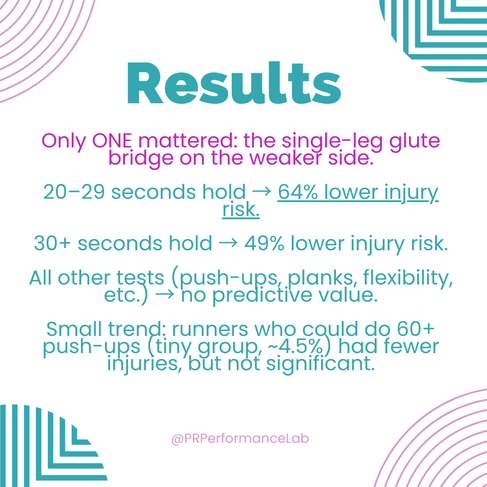The ONE Strength Test That Predicts Running Injuries
- Dayna Player Robinson

- Sep 1, 2025
- 3 min read
Updated: Sep 2, 2025

The Surprising Strength Test That Predicts Running Injuries
What if one simple exercise could give you a peek into your risk of injury while training for your next race?
That’s exactly what researchers looked at in a new study published in the Clinical Journal of Sport Medicine (July 2025). The team followed nearly 900 runners training for the New York City Marathon and asked them to complete a strength and flexibility self-assessment 16 weeks before the race. Then, they tracked injuries across training.
Here’s what they found—and how it can help you run stronger and healthier.
The Big Takeaway: The Single-Leg Glute Bridge
Out of all the tests, only one stood out as a predictor of injury: the single-leg glute bridge on the weaker side.
Runners who could hold the position 20–29 seconds had a 64% lower risk of injury compared to those who could only manage 0–9 seconds.
Holding for 30+ seconds still showed a benefit—a 49% lower risk.
That’s a huge difference, especially when you consider that over 36% of runners in the study sustained an overuse injury while preparing for the marathon.

Why the Glute Bridge Matters
The glutes, particularly the hip abductors, play a big role in stabilizing your pelvis and absorbing load while you run. Weakness in this area can lead to classic running injuries like:
IT band syndrome
Runner’s knee
Hamstring strains
Low back pain
If your hips aren’t strong enough, other tissues end up taking the load—and that’s where overuse injuries sneak in.
From My Coaching Perspective
Here’s the fun part: the single-leg glute bridge is one of the very first tests I do during a running assessment. And I often tell athletes right away, “This is very likely going to be one of your homework assignments.”
So, I wasn’t super surprised when this research confirmed it as the #1 must-do exercise for runners.
What did surprise me was just how strongly it was linked to injuries—64% lower risk is no small number. It really reinforces how critical hip strength is for keeping runners healthy.
What Runners Should Do
This study highlights what many coaches and physios have been preaching for years: strength training isn’t optional for runners—it’s injury insurance.
Here’s how you can put this into practice:
1. Test Yourself
Lie on your back with knees bent, feet flat.
Extend one leg out and hold your hips high, keeping them level.
Time how long you can hold.
Compare both sides—your weaker side is the one to note.
2. Strengthen the Weak Links
If you struggle to hold past 20 seconds, it’s time to train your glutes consistently. Great options include:
Single-leg glute bridges
Side-lying clamshells
Banded lateral walks
Bulgarian split squats
Deadlifts and hip thrusts
3. Add It Into Your Routine
2–3 short strength sessions per week can be enough.
Focus on quality, not quantity—building control and stability pays off on the run.
The Bottom Line
This research confirms what so many injured runners already know: strong hips keep you running.
A quick self-check with the single-leg glute bridge can give you valuable insight into your risk of injury. And the good news? If you find weakness, you can do something about it.
It’s no wonder this is one of my go-to assessments and “homework” exercises. Now we have the science to back up just how important it is.
Strengthening your glutes and hip stabilizers doesn’t just prevent injuries—it makes you a more powerful, efficient runner. And that’s the kind of training edge every runner could use.

I’m here to help you train smarter, fuel better, and run stronger all summer long.
Let’s chase your version of awesome.
Happy running
Dayna - your fav. Exercise Physiologist & Run Coach
Set Yourself Up for Success
Learn how to train smarter, not harder.
This workshop dives into the running form - Discover how small adjustments to your form can make a big difference in preventing injuries, improving efficiency, and increasing your performance.

Don’t wait —schedule your running assessment or join my coaching programs today and take your running to the goal you want!
➡️ Click here to book your appointment now.
Want more help?
Join our Running Workshop here!
Or
Learn how you can run more efficiently Running Assessment
Or
Get your FREE Strength Assessment here!
Or
Join our online 12-week strength program here!












Comments